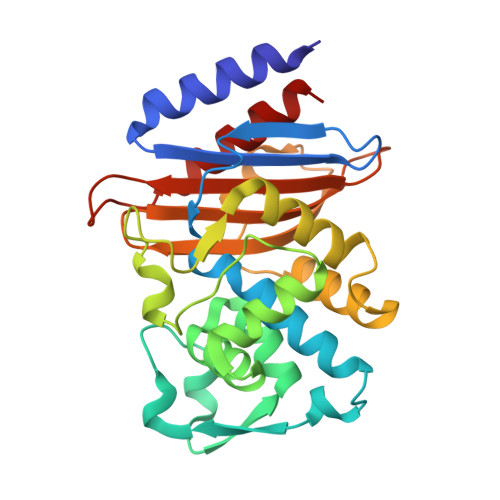Antagonism between substitutions in beta-lactamase explains a path not taken in the evolution of bacterial drug resistance.
Brown, C.A., Hu, L., Sun, Z., Patel, M.P., Singh, S., Porter, J.R., Sankaran, B., Prasad, B.V.V., Bowman, G.R., Palzkill, T.(2020) J Biological Chem 295: 7376-7390
- PubMed: 32299911
- DOI: https://doi.org/10.1074/jbc.RA119.012489
- Primary Citation of Related Structures:
6V5E, 6V6G, 6V6P, 6V7T, 6V83, 6V8V - PubMed Abstract:
CTX-M β-lactamases are widespread in Gram-negative bacterial pathogens and provide resistance to the cephalosporin cefotaxime but not to the related antibiotic ceftazidime. Nevertheless, variants have emerged that confer resistance to ceftazidime. Two natural mutations, causing P167S and D240G substitutions in the CTX-M enzyme, result in 10-fold increased hydrolysis of ceftazidime. Although the combination of these mutations would be predicted to increase ceftazidime hydrolysis further, the P167S/D240G combination has not been observed in a naturally occurring CTX-M variant. Here, using recombinantly expressed enzymes, minimum inhibitory concentration measurements, steady-state enzyme kinetics, and X-ray crystallography, we show that the P167S/D240G double mutant enzyme exhibits decreased ceftazidime hydrolysis, lower thermostability, and decreased protein expression levels compared with each of the single mutants, indicating negative epistasis. X-ray structures of mutant enzymes with covalently trapped ceftazidime suggested that a change of an active-site Ω-loop to an open conformation accommodates ceftazidime leading to enhanced catalysis. 10-μs molecular dynamics simulations further correlated Ω-loop opening with catalytic activity. We observed that the WT and P167S/D240G variant with acylated ceftazidime both favor a closed conformation not conducive for catalysis. In contrast, the single substitutions dramatically increased the probability of open conformations. We conclude that the antagonism is due to restricting the conformation of the Ω-loop. These results reveal the importance of conformational heterogeneity of active-site loops in controlling catalytic activity and directing evolutionary trajectories.
- Department of Pharmacology and Chemical Biology, Baylor College of Medicine, Houston, Texas 77030.
Organizational Affiliation:
















